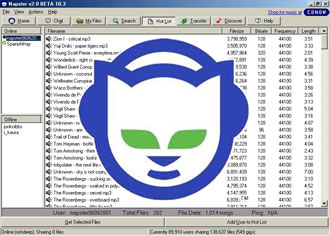
There was a documentary produced by VH1 that might be of interest to fans of music, technology, or pop culture. And it should also serve as a lesson in how new technologies can alter consumer behavior. Downloaded, a documentary directed by Alex Winter, tells the story of how the rise of online downloadable music changed the record business. In a way, it’s also the story of the downfall of the record industry and their failure to understand the changing demands of their customers.
Downloaded devotes considerable time to the rise and fall of Napster, the online company that started it all, while gaining much notoriety between 1999 and 2001. Music fans would certainly recall Napster’s system, which allowed fans to share and download millions of music files for free. Although the music industry was momentarily caught off guard, Napster was eventually shut down due to several copyright infringement lawsuits filed by a number of recording artists, major record labels and the Recording Industry Association of America. But the music business would never be the same, and the debate over music ownership and artist royalties continues today.
While I support and respect copyright ownership, I find it difficult to sympathize with the record companies. Napster’s technology provided a better way for music fans to get the music they wanted. Yes, they were getting it for free, but that’s not what Napster was really about. It was about getting the exact music of your choice in a way that was as quick as it was easy. Napster users could download an individual song without having to purchase an entire album of music they didn’t want. Record companies continued to release albums on CDs and considered Napster users internet pirates who were stealing their copyrighted content.
Although it can’t be disputed that music piracy was indeed taking place, the music industry either neglected or refused to recognize that the distribution of music had virtually changed overnight. Rather than examine this revolutionary phenomenon from a marketing perspective, they chose litigation to solve the problem. They successfully shut down Napster, but the genie was out of the bottle. The distribution of recorded music could never go back to the way it was.
The record industry might have won their legal battle, but they may have lost the marketing war. In the years that followed, Napster’s assets were purchased by other companies, rebranded, and eventually purchased by electronics retailer Best Buy. Today, Napster distributes online digital music worldwide. Meanwhile the record industry has been in steady decline for more than a decade. Because they were so caught up in shutting down Napster, they missed the opportunity of getting into the forefront of this new technology.
Today there are thousands of online digital music distributors, many turning a decent profit while maintaining compliance with copyright law. And it turns out that music fans are happy to pay for downloaded music because, as any savvy marketer knows, when the customer is getting exactly what they want, they’re usually willing to pay for it. The music industry somehow managed to miss this basic business principle.
